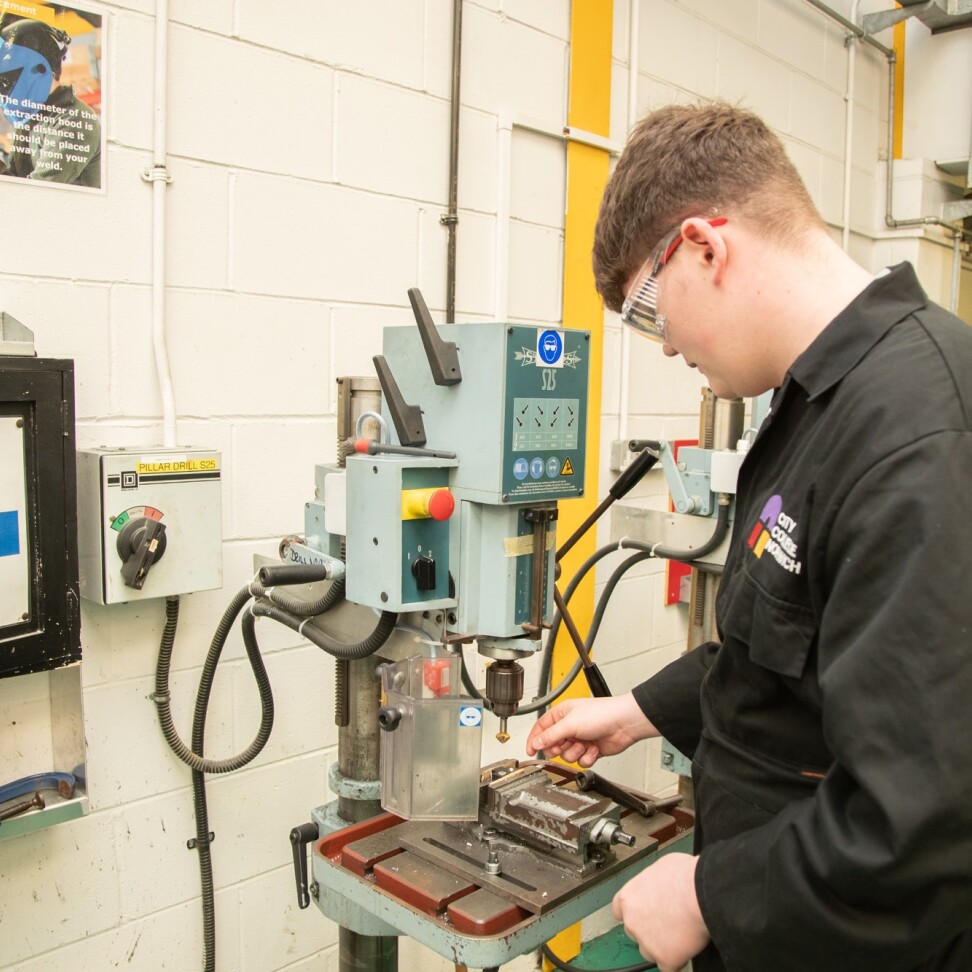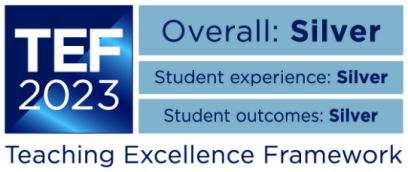HNC Mechanical Engineering for England (HTQ)

The aim of our HNC in Mechanical Engineering for England is to develop you as a professional, self-reflecting individual who is able to meet the demands of employers in the engineering sector and to adapt to a constantly changing world.
- Level
- 4
- Entry Point
- Sep 2025
- Duration
- Part Time, 2 years
- Venue
- City College Norwich campus
- CCN Course Code
- G0063
Reasons to study
this course
The objectives of this qualification are to equip you with the skills, knowledge and understanding that you need to achieve a high performance in the engineering and manufacturing environment. This course will help you develop an enquiring mind, giving you the abilities and confidence to work across different engineering functions, lead, manage, adapt to change, and tackle a range of complex engineering situations. It will provide the core skills required for a range of careers in engineering, specifically those related to mechanical engineering and will offer a balance between employability skills and the knowledge essential for entrepreneurial, employment or academic ambitions. It will develop your understanding of the major impact that new digital and software technologies have on the engineering environment, provide insight to mechanical engineering operations and the opportunities and challenges presented by a global marketplace and equip you with knowledge and understanding of culturally diverse organisations, cross-cultural issues, diversity and values.
Dr Dimitris Kakofengitis - Course Leader HNC Mechanical Engineering (HTQ)
This programme is designed to help you build the skills, knowledge, and confidence you need to succeed in the field of engineering. As your Course Leader, my main goal is to make sure you feel supported and motivated, helping you grow both personally and professionally. If you have any questions or need advice, I’m here to help.
Contact course leaderWhere will this
course take you?
This qualification aims to widen access to Higher Education and enhance the career prospects of those who undertake them.
Completing a Higher National Certificate (HNC) in Mechanical Engineering can open various career opportunities in the engineering sector. This qualification equips you with essential skills and knowledge, making you suitable for roles such as Maintenance Engineer, Engineering Maintenance Technician, and other positions within engineering-related industries.
Beyond immediate employment, an HNC in Mechanical Engineering offers progression routes for further education. For instance, here at City College Norwich we provide a Higher National Diploma (HND) in Mechanical Engineering as a top-up course, allowing HNC graduates to advance their qualifications.
Additionally, pursuing a full Honours degree, such as a Bachelor of Engineering (BEng) in Mechanical Engineering, is an option.
In summary, an HNC in Mechanical Engineering can lead to various employment opportunities with competitive salaries and provides a foundation for further academic progression within the engineering field.
Course structure
This course is studied part time over one and a half years. This programme is delivered over one day a week - 30 teaching weeks per year. Employed students are expected to be granted one day off from work each week throughout the year.
Level 4 modules
Engineering Design Compulsory
The tremendous possibilities of the techniques and processes developed by engineers can only be realised by great design. Design turns an idea into a useful artefact, the problem into a solution, or something ugly and inefficient into an elegant, desirable, and cost-effective everyday object. Without a sound understanding of the design process, the engineer works in isolation without the links between theory and the needs of the end user.
The aim of this unit is to introduce to the methodical steps that engineers use in creating functional products and processes as an individual or part of a design team; from a design brief to the work, and the stages involved in identifying and justifying a solution to a given engineering need. Among the topics included in this unit are: Gantt charts and critical path analysis, stakeholder requirements, market analysis, design process management, technical drawing, modelling and prototyping, manufacturability, sustainability and environmental impact, reliability, safety and risk analyses, and ergonomics.
On successful completion of this unit, you will be able to prepare an engineering design specification that satisfies stakeholders’ requirements, implement best practices when analysing and evaluating possible design solutions, prepare a written technical design report, and present your finalised design to a customer or audience.
Assessment:
- Two assignments (100% of module weighting)
Engineering Mathematics Compulsory
The mathematics that is delivered in this unit is directly applicable to the engineering and manufacturing industry, and it will help to increase your knowledge of the broad underlying principles within this discipline.
The aim of this unit is to develop your skills in the mathematical principles and theories that underpin the engineering curriculum. You will be introduced to mathematical methods and statistical techniques in order to analyse and solve problems within an engineering and manufacturing context.
On successful completion of this unit, you will be able to employ mathematical methods within a variety of contextualised examples, interpret data using statistical techniques, and use analytical and computational methods to evaluate and solve engineering and manufacturing sector problems.
Assessment:
- One assignment (100% of module weighting)
Managing a Professional Engineering Project Compulsory
The responsibilities of the engineer go far beyond completing the task in hand. Reflecting on their role in a wider ethical, environmental, and sustainability context starts the process of becoming a professional engineer – a vital requirement for career progression.
Engineers seldom work in isolation and most tasks they undertake require a range of expertise, designing, developing, manufacturing, constructing, operating, and maintaining the physical infrastructure and content of our world. The bringing together of these skills, expertise, and experience is often managed through the creation of a project.
This unit introduces you to the techniques and best practices required to successfully create and manage an engineering/manufacturing project designed to identify a solution to an engineering need. While carrying out this project, you will consider the role and function of engineering in our society, the professional duties and responsibilities expected of engineers together with the behaviours that accompany their actions.
Among the topics covered in this unit are: roles, responsibilities, and behaviours of a professional engineer, planning a project, project management stages, devising solutions, theories and calculations, management using a Gantt chart, evaluation techniques, communication skills, and the creation and presentation of a project report.
On successful completion of this unit, you will be able to conceive, plan, develop, and execute a successful engineering project, and produce and present a project report outlining and reflecting on the outcomes of each of the project processes and stages. As a result, you will develop skills such as critical thinking, analysis, reasoning, interpretation, decision-making, information literacy, and information and communication technology, and skills in professional and confident self-presentation.
Assessment:
- Two assignments (100% of module weighting)
Production Engineering for Manufacture Compulsory
All of the manufactured products we use in our daily lives, from processed food to clothing and cars, are the result of production engineering. Production engineers need to have a comprehensive knowledge and understanding of all the possible production technologies available, their advantages and disadvantages, the requirements of the production system operation and the interaction between the various components of the production system.
This unit introduces you to the production process for key material types; the various types of machinery used to manufacture products and the different ways of organising production systems to optimise the production process; consideration of how to measure the effectiveness of a production system within the overall context of the manufacturing system; and an examination of how production engineering contributes to ensuring safe and reliable operation of manufacturing.
On successful completion of this unit you will be able to learn about the role and purpose of production engineering and its relationship with the other elements of a manufacturing system; most appropriate production processes and associated facility arrangements for manufacturing products of different material types; and designing a production system incorporating a number of different production processes.
Assessment:
- Two assignments (100% of module weighting)
Mechanical Principles Compulsory
Mechanical principles have been crucial for engineers to convert the energy produced by burning oil and gas into systems to propel, steer and stop our automobiles, aircraft, and ships, amongst thousands of other applications. The knowledge and application of these mechanical principles is still the essential underpinning science of all machines in use today or being developed into the latest technology.
The aim of this unit is to introduce you to the essential mechanical principles associated with engineering applications. Topics included in this unit are: behavioural characteristics of static, dynamic and oscillating engineering systems including shear forces, bending moments, torsion, linear and angular acceleration, conservation of energy and vibrating systems; and the movement and transfer of energy by considering parameters of mechanical power transmission systems.
On successful completion of this unit you will be able to learn about the underlying principles, requirements, and limitations of mechanical systems.
Assessment:
- Two assignments (100% of module weighting)
Quality and Process Improvement Compulsory
Quality has always been the key to business success and survivability, but it requires organisations to allocate a lot of effort and resources to achieve it. The key to providing quality services and designing top quality products lies in the strength and effectiveness of the processes used in their development; processes which must be constantly reviewed to ensure they operate as efficiently, economically and as safely as possible.
This unit introduces you to the importance of quality assurance processes in a manufacturing or service environment and the principles and theories that underpin them. Topics included in this unit are: tools and techniques used to support quality control, attributes and variables, testing processes, costing modules, the importance of qualifying the costs related to quality, international standards for management (ISO 9000, 14000, 18000), European Foundation for Quality Management (EFQM), principles, tools and techniques of Total Quality Management (TQM) and implementation of Six Sigma.
On successful completion of this unit you will be able to illustrate the processes and applications of statistical process, explain the quality control tools used to apply costing techniques, identify the standards expected in the engineering environment to improve efficiency and examine how the concept of Total Quality Management and continuous improvement underpins modern manufacturing and service environments.
Assessment:
- Two assignments (100% of module weighting)
Fundamentals of Thermodynamics and Heat Engines Compulsory
Thermodynamics is one of the most common applications of science in our lives, and it is so much a part of our daily life that it is often taken for granted. For example, when driving your car, the chemical energy from the fuel or electrical energy from the batteries are converted into mechanical energy to propel the vehicle, and the heat produced by burning gas when cooking will produce steam which can lift the lid of the pan. These are examples of thermodynamics, which is the study of the dynamics and behaviour of energy and its manifestations.
This unit introduces you to the principles and concepts of thermodynamics and its application in modern engineering.
On successful completion of this unit you will be able to learn about fundamental thermodynamic systems and their properties, the steady flow energy equation to plant equipment, principles of heat transfer to industrial applications, and the performance of internal combustion engines.
Assessment:
- Two assignments (100% of module weighting)
Fluid Mechanics Compulsory
Fluid mechanics is an important subject to scientists and engineers of many disciplines, not just those working directly with fluid systems. Mechanical engineers need to understand the principles of hydraulic devices and turbines (wind and water); aeronautical engineers use these concepts to understand flight and design flying machines, while civil engineers typically concentrate on water supply, sewerage, and irrigation.
This unit introduces you to the fluid mechanics principles and techniques used in mechanical engineering. In particular, the hydraulic devices and systems that incorporate the transmission of hydraulic pressure and forces exerted by a static fluid on immersed surfaces. Topics included in this unit are: pressure and force, submerged surfaces, fluid flow theory, aerodynamics, and hydraulic machinery.
On successful completion of this unit you will be able to learn about the concept and measurement of viscosity in fluids, and the characteristics of Newtonian and nonNewtonian fluids; fluid flow phenomena, including energy conservation, estimation of head loss in pipes and viscous drag; and the operational characteristics of hydraulic machines, in particular the operating principles of various water turbines and pumps.
Assessment:
- Two assignments (100% of module weighting)
Course details
Assessment methods
Your assignments will reflect the wide range of skills and knowledge developed throughout the course, and will aim to target particular industry-specific skills. An assignment may take a variety of forms, including practical and written.
Awarded by
This course is awarded by Pearson Education Ltd. and regulated by The Office of Qualifications and Examinations Regulation (Ofqual) in England.

We were awarded a TEF Silver rating overall in 2023, achieving this for both student experience and student outcomes.

Search courses
Search CCN HE



